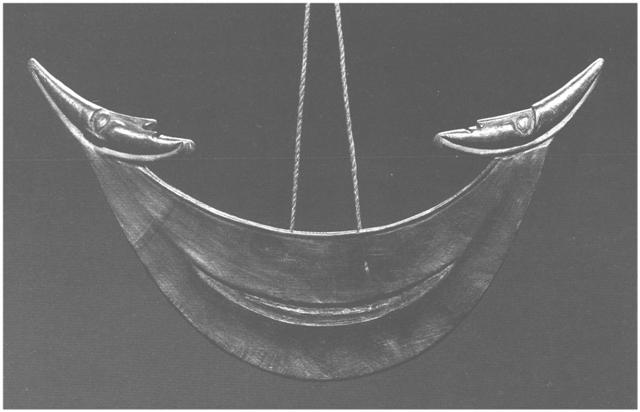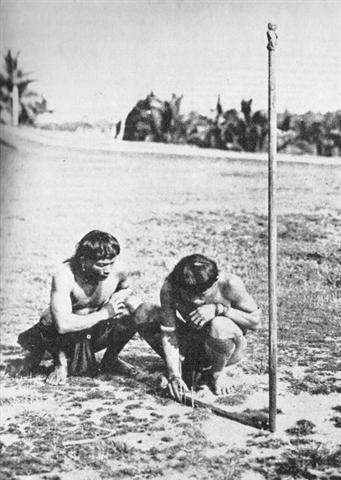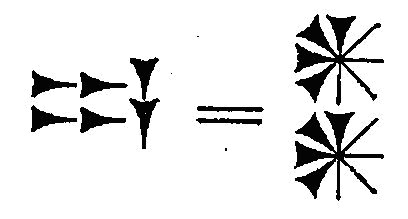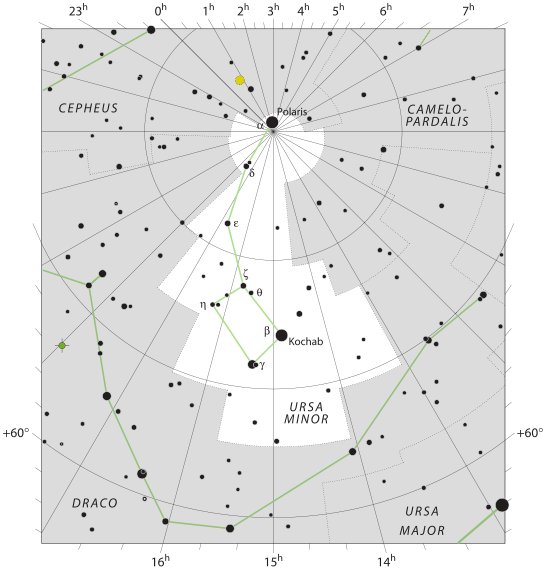Once again. There was a double-faced structure
for measuring the Sun year:


One phase (face) was defined from the rays of the Sun (the tropic
year) and the other from the positions of the stars (the sidereal
year).

... The most ancient of all astronomical
instruments, at least in China, was the simple vertical pole.
With this one could measure the length of the sun's shadow by
day to determine the solstices ... and the transits of stars by
night to observe the revolution of the sidereal year. It was
called pei or piao, the meaning of the former
being essentially a post or pillar, and the latter an indicator.
Pei can be written with the bone radical ... or with the
wood radical, in which case it means a shaft or handle. Ancient
oracle-bone forms of the phonetic component show a hand holding
what seems to be a pole with the sun behind it at the top
... so that although this component alone
came to mean 'low' in general, it may perhaps have referred
originally to the gnomon itself. This is after all an object low
on the ground in comparison with the sun, and shows the long
shadow of a low sun at the winter solstice, the moment which the
Chinese always took as the beginning of the tropic year
...
If there was a vero early in April, then this ought to imply a
cardinal point for the Sun, because April was a month defined in
the Sun calendar.
...
Mq.: veo, tenth month of the lunar year. Ha.: welo,
a month (about April) ...
This point in time (0h) could be observed late at night when the
First Point of Aries returned to visibility after its close
encounter with the Sun. 80 (0h) + 16 = 106 (April 16).
But the coordination between the tropic and sidereal years, which
had been firmly established in Roman times, would lead us to the calculation 84
(Julian equinox) + 16 = 100 ('April 10). And at the time of
rongorongo the position of 'April 10 (100) at the Full Moon
would have
moved ahead with 27 right ascension days to May 7 (127) at Ga6-25:
|
AUG 29 |
30 (242) |
31 |
SEPT 1 |
2 (*165) |
3 (246) |
 |
 |
 |
 |
 |
 |
|
Ga6-21 |
Ga6-22 |
Ga6-23
|
Ga6-24
(164) |
→ 6 * 25 = 300 / 2 |
Ga6-26 |
|
KOCHAB
(Kakkab) = β Ursae Min.
(225.0), ξ Librae (225.7) |
KE KWAN (Cavalry Officer) = β Lupi
(226.3),
KE KWAN = κ Centauri (226.4),
ZUBEN ELAKRIBI
(Claw of the Scorpion) =
δ
Librae
(226.8),
π¹
Oct.
(226.9)
*185.0 = *226.4 - 41.4 |
ω Bootis (227.2),
NEKKAR
(Herdsman) = β Bootis
(227.3), σ Librae (227.5), π² Oct. (227.7),
NADLAT (Mean Little Ones) = ψ Bootis
(227.8), π Lupi (227.9) |
15h (228.3)
ZUBEN HAKRABIM
= ν Librae
(228.3), λ Lupi (228.9) |
ω
Oct. (229.3),
ι
Librae (229.6),
κ
Lupi (229.7),
ζ
Lupi (229.8) |
Al Zubānā-14b (Claws)
χ
Bootis (230.3),
PRINCEPS =
δ
Bootis
(230.6),
ZUBEN ELSCHEMALI
(Northern Claw) =
β
Librae
(230.8) |
|
... at the
ancient time of Bharani the star at the North Pole
was not Polaris but β Ursae Minoris - Kochab (as in
Babylonian Kakkab = Star).
 |
|
Nov 1 |
2 |
3 (*227 → π) |
4 (308) |
5 |
→ 62 * 5 |
|
°Oct 28
(301) |
29 |
30 |
31
(*224) |
°Nov 1 |
2 |
|
'Oct 5 |
6 (*199) |
7 (280) |
8 |
9 |
10 |
|
"Sept 21 |
EQUINOX
(*185) |
(266 = 227 + 39) |
24 |
25 |
26 |
|
NAKSHATRA DATES: |
|
FEBR 28 |
MARCH 1
(*345) |
2 |
3 |
4 (428) |
5 (64) |
|
ρ
Arietis (43.0),
GORGONEA SECUNDA =
π
Persei
(43.5),
ACAMAR
(End of the River) =
θ
Eridani
(43.6),
ε
Arietis (43.7),
λ
Ceti (43.9)
DENEBOLA (β Leonis) |
MENKAR
(The Nose) =
α
Ceti
(44.7) |
3h (45.7)
GORGONEA TERTIA =
ρ
Persei
(45.1),
ALGOL
(The Demon) =
β
Persei
(45.9) |
ι
Persei (46.1),
MISAM (Next to the Pleiades) =
κ
Persei
(46.2),
GORGONEA QUARTA =
ω
Persei
(46.7),
BOTEIN (Pair of Bellies) =
δ
Arietis
(46.9) |
ζ Arietis (47.7) |
ZIBAL (Young Ostriches) =
ζ
Eridani
(48.0),
κ
Ceti (48.9) |
|
May 3 |
4 (124) |
5 (84 + 41) |
6 |
7 (100 + 27) |
8 (*413) |
|
°April
29 |
30 (120) |
°May 1
(*41) |
2 |
3 (*408) |
4 |
|
'April 6 |
7 |
8 (*383) |
9 (464) |
10 (100) |
11 |
|
"March
23 |
24 |
25 (84) |
26 (450) |
27 |
28 |
|
SEPT 4 |
5 (248) |
6 |
 |
 |
 |
|
Ga6-27 |
Ga6-28
(168) |
Ga6-29 |
|
μ Lupi, γ Tr. Austr. (231.3), ο Librae (231.8) |
ο
Cor. Borealis (232.0),
δ
Lupi (232.1),
φ¹,
ν²
Lupi (232.2),
ν¹
Lupi (232.3),
ε
Lupi (232.4),
φ²
Lupi (232.5),
PHERKAD
(The Dim One of the Two Calves) =
γ
Ursae Min.
(232.6),
ε
Librae (232.7),
η
Cor. Borealis (232.8),
υ
Lupi (232.9)
*191.0 = *232.4 - 41.4 |
ALKALUROPS
(The Herdsman's Lance) =
μ
Bootis
(233.1),
ED ASICH (Male Hyena) =
ι
Draconis
(233.2) |
|
Nov 7 |
8 (*232) |
9 (313) |
|
°Nov 3 (*227) |
4 (308) |
5 |
|
'Oct 11 (*204) |
12 (285) |
13 |
|
"Sept 27
(*190) |
28 (232 + 39) |
29 (272) |
|
NAKSHATRA DATES: |
|
MARCH 6
(*350) |
7 (66) |
8 (432) |
|
τ Arietis (49.7) |
ALGENIB PERSEI = α Persei
(50.0), ο Tauri (50.2), ξ Tauri (50.8)
GIENAH (γ Corvi) |
σ Persei (51.6) |
|
May 9
(*414) |
10 (130) |
11 (496) |
|
°May 5 |
6 (*46) |
7 (127) |
|
'April
12 (*387) |
13 (468) |
14 (104) |
|
"March
29 (88) |
30 (454) |
31
(*375) |
|
SEPT 7
(250 = 234 + 16) |
8 (*171) |
9 |
 |
 |
 |
|
Ga7-1
(314 - 144) |
Ga7-2 |
Ga7-3
(172) |
|
NUSAKAN
(Pauper's Bowl) = β Cor. Bor.
(234.0), κ¹ Apodis (234.3), ν Bootis (234.7), ζ
Librae (234.9) |
θ Cor. Borealis (235.3), γ Lupi (235.6),
GEMMA = α Cor. Bor.,
ZUBEN
ELAKRAB
= γ Librae, QIN = δ Serpentis, ε Tr. Austr. (235.7), μ Cor. Borealis (235.8), υ Librae (235.9)
SIRRAH (α Andromedae) |
φ Bootis (236.2), ω Lupi, τ Librae (236.3), ψ¹ Lupi
(236.7), ζ Cor. Borealis (236.9) |
|
... In other words, the ancient Druidic religion
based on the oak-cult will be swept away by
Christianity and the door - the god Llyr - will
languish forgotten in the Castle of Arianrhod, the
Corona Borealis. This helps us to understand
the relationship at Rome of Janus and the White
Goddess Cardea who is ... the Goddess of Hinges who
came to Rome from Alba Longa. She was the hinge on
which the year swung - the ancient Latin, not the
Etruscan year - and her importance as such is
recorded in the Latin adjective cardinalis -
as we say in English 'of cardinal importance - which
was also applied to the four main winds; for winds
were considered as under the sole direction of the
Great Goddess until Classical times ... |
|
Nov 10
(314 → π) |
11 (*235) |
12 |
|
°Nov
6 (310) |
7 (*231) |
8 |
|
'Oct 14
(287) |
15
(*208) |
16 |
|
"Sept 30
(273) |
"Oct 1 (235
+ 39) |
2 (*195) |
|
NAKSHATRA DATES: |
|
MARCH 9
(68) |
10
(*354) |
11 |
|
no star listed (52) |
ψ
Persei (53.1)
ACRUX (α
CRUCIS) |
δ
Persei (54.7) |
|
May 12 (132) |
13 (*53) |
14 |
|
°May
8 (128) |
9 (*49) |
10 |
|
'April
15 |
16 (471) |
17 (107) |
|
"April 1
(91) |
2 (*377) |
3 |
|
SEPT 10
(*173) |
11 (254) |
 |
 |
|
Ga7-4 (173) |
Ga7-5 |
|
κ
Librae (237.2),
ι
Serpentis (237.4),
ψ²
Lupi,
ρ
Oct.
(237.5), γ Cor. Borealis, η Librae (237.7),
COR
SERPENTIS
= α Serpentis
(237.9)
*196.0 = *237.4 - *41.4 |
π
Cor. Borealis,
UNUK ELHAIA (Necks of the Serpents) =
λ
Serpentis
(238.1),
CHOW =
β
Serpentis
(238.6) |
|
Nov 13
(*237) |
14 (318) |
|
°Nov
9 (*233) |
10 (314) |
|
'Oct 17
(290) |
18 (*211) |
|
"Oct 3
(*196) |
4 (277 = 238 + 39) |
|
NAKSHATRA DATES: |
|
MARCH 12
(436 = 365 + 71) |
13
(*357) |
|
Al Thurayya-27 /
Krittikā-3 /
Hairy Head-18 |
|
TAU-ONO (Six Stones)
ATIKS =
ο
Persei, RANA (Frog) =
δ
Eridani
(55.1),
CELAENO (16 Tauri), ELECTRA (17),
TAYGETA (19),
ν
Persei
(55.3),
MAIA (20), ASTEROPE (21), MEROPE (23)
(55.6) |
Temennu-3 (Foundation Stone)
ALCYONE
(56.1),
PLEIONE
(28 Tauri),
ATLAS
(27 Tauri)
(56.3) |
|
May 15
(500 = 436 + 8 * 8) |
16 (136 = 365 - 229) |
|
°March 11 (131) |
12 (*52) |
|
'April 18 (108 = 540 / 5) |
19 (474
= 2 * 237) |
|
"April 4 (94) |
5 (460) |

|










